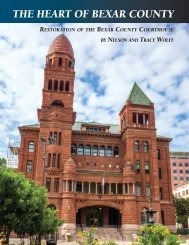Oklahoma: A Story Through Her People
A full-color photography book showcasing Oklahoma paired with the histories of companies, institutions, and organizations that have made the state great.
A full-color photography book showcasing Oklahoma paired with the histories of companies, institutions, and organizations that have made the state great.
You also want an ePaper? Increase the reach of your titles
YUMPU automatically turns print PDFs into web optimized ePapers that Google loves.
CHICKASAW<br />
NATION<br />
Above: Bill Anoatubby, governor of the<br />
Chickasaw Nation.<br />
Since Bill Anoatubby was elected governor<br />
of the Chickasaw Nation in 1987, the tribe<br />
has become a major force in a positive transformation<br />
underway in southern <strong>Oklahoma</strong>.<br />
In recent years that transforming power has<br />
had an increasingly powerful effect on the<br />
entire state.<br />
Most have heard the phrase “a rising tide<br />
lifts all boats.” While that metaphor has been<br />
used effectively to illustrate the idea that a<br />
growing economy benefits everyone, it could<br />
be extended to just as effectively illustrate<br />
the same principle with any indicator of the<br />
quality of life.<br />
A growing economy benefits everyone<br />
concerned because more money circulating in<br />
the economy means rewarding employment is<br />
more readily available, people are more likely<br />
to have access to disposable income and new<br />
businesses are more likely to succeed.<br />
There is a similar dynamic at work in regard<br />
to other factors affecting the quality of life.<br />
Better hospitals, staffed with more doctors,<br />
nurses and other healthcare providers, naturally<br />
lead to easier access to quality healthcare.<br />
More highly qualified, motivated law<br />
enforcement officers equipped with first-rate<br />
tools of the trade improves public safety.<br />
While a rising tide begins with a robust,<br />
growing economy, that tide truly lifts all<br />
boats when the money produced is reinvested<br />
into the community, leading to more business<br />
opportunities, pride in community, higher<br />
quality healthcare, a more effective transportation<br />
system and more confidence in the<br />
level of public safety.<br />
That is the reason the Chickasaw Nation,<br />
under the visionary leadership of Governor<br />
Anoatubby, takes a comprehensive view of a<br />
variety of factors as it strives to achieve its<br />
mission to enhance the overall quality of life<br />
of the Chickasaw people.<br />
A healthy, growing economy is the<br />
foundation of that mission and the tribe has<br />
focused a great deal of time and energy on<br />
economic development.<br />
Since the Chickasaw Nation began operating<br />
its first tribal business in 1972, the tribe<br />
has made a concerted effort to build a<br />
sustainable source of revenue by diversifying<br />
its business portfolio.<br />
When the Chickasaw Nation opened its<br />
first business, the Chickasaw Motor Inn in<br />
Sulphur, <strong>Oklahoma</strong>, it developed a wide<br />
range of other opportunities and now<br />
operates more than 100 successful businesses.<br />
Less than three decades ago, in 1987,<br />
the Chickasaw Nation operated just over<br />
thirty programs with more than ninety<br />
percent of the funding coming from the<br />
federal government. The budget for federal<br />
programs was little more than $7 million.<br />
Today, successful tribal economic development<br />
efforts enable the Chickasaw Nation to<br />
fund a majority of its programs and services.<br />
The tribe offers more than 200 tribally<br />
funded programs. The tribal budget has<br />
grown exponentially, funding services from<br />
education, healthcare and nutrition to<br />
housing and family services.<br />
Although the primary goals of economic<br />
development are providing revenue for the<br />
tribe’s government and funding for programs<br />
and services, there is ample evidence the<br />
Chickasaw Nation is making a significant<br />
contribution to the overall health of the<br />
economy in <strong>Oklahoma</strong>.<br />
A study found that the Chickasaw Nation<br />
had an economic impact of more than<br />
$2.4 billion on the <strong>Oklahoma</strong> economy in<br />
2011 and supported approximately 16,000<br />
jobs in <strong>Oklahoma</strong>.<br />
Chickasaw Nation businesses generated<br />
$1.39 billion from tribal business activities,<br />
which include manufacturing, banking,<br />
tourism, energy, healthcare, hospitality<br />
and entertainment.<br />
At the time of the study, the Chickasaw<br />
Nation employed more than 10,000 people<br />
in <strong>Oklahoma</strong> with $318 million in direct<br />
payroll contributions. That makes the tribe<br />
the seventh largest employer in <strong>Oklahoma</strong>,<br />
surpassing even the U.S. Postal Service.<br />
Multiplier effects of Chickasaw Nation<br />
operations helped create more than 5,900<br />
additional jobs with a payroll of more than<br />
$206 million. In total, tribal business and<br />
governmental operations resulted in $525<br />
million in income for <strong>Oklahoma</strong> workers.<br />
While this contribution to the health of<br />
the <strong>Oklahoma</strong> economy is meaningful in<br />
itself, it is made even more significant<br />
O K L A H O M A : A S t o r y T h r o u g h H e r P e o p l e<br />
190
















